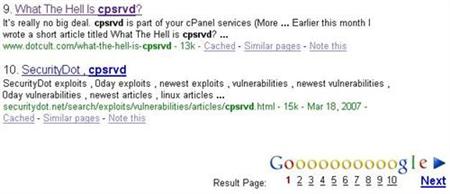Author Archive
Those of you who regularly read this blog might be familiar with an article I wrote last month titled What The Hell is cpsrvd. It was basically just an example of how to write a useful SEO article.
I was searching for information about cpsrvd and realized that I couldn’t find everything I was looking for in one post, so I wrote one of my own. That’s always been a great SEO strategy. In fact, it’s how NoSlang.com and TextMemos.com were created.
Anyway, I noticed a lot of search traffic coming for the term “cpsrvd”. (which will no doubt increase after this article eh?)
Anyway, it wasn’t as much as I had expected from being on the front page of Google for that term. There was a small problem. Take a look, can you spot it?

Look at that title tag. It’s hideous. No wonder nobody’s clicking.
Luckily, there’s a great wordpress plugin called seo title tag plugin that lets you have more control over what your wordpress <title> tags look like.
Here’s that same Google results after the title tag change was spidered:

Looks like it’s not only more readable, but that it actually moved up in the results too.
Remember: your blog title may be great, but it’s not relevant to every article you post. Do your readers a favor and make sure you’re using great title tags. Sometimes, it’s all they have to go on when judging whether or not to visit your page.
March 21st, 2007
The New Yorker posted a coversation between adults as imagined by children but even funnier was the bottom part titled How College Kids Imagine the United States Government.
It got me thinking about a protest group I saw yesterday. Somewhere on Woodward and 9mile was a group of people all holding signs that said stuff like “Honk for peace” or “Honk to impeach Bush.”
While I like that they’re trying to encourage peace (to avoid a political debate, we’ll avoid my feelings on impeaching Bush), I had to question what good they were doing by standing there with their signs.
If you want peace, do something about it. You’re on the right track, but making me honk my horn isn’t going to make any difference in the world whatsoever. Most Americans already want peace – why wouldn’t they? The problem is, what can we do about it?
If you want to make a difference in the world don’t just stand on a street corner, do something about it. Go down to your local soup kitchen and volunteer, get involved with habitat for humanity or UNICEF.
Plant a tree, feed a homeless person, donate money, mentor a child, coach a team, help out at your church, launch a free web service, or if you want to voice your opinion write an editorial for your local newspaper.
I appreciate where you’re coming from, you have the right mindest – but I think you can better apply yourself to reach your goal.
There are plenty of ways to get involved and actually make a difference in this world; standing on the corner and asking me to honk my horn isn’t one of them.
March 20th, 2007
I’ve been having a weird problem with a particular DSL connection lately. It would seem that I can’t access certain websites hosted in the Dallas area. The bigger problem is that these are MY websites!!
At first I thought they were down, but not according to my live 3rd party web stats (and thankfully my Adsense earnings are still growing too.) It seems other people can access the server as well, just not me.
So I used a proxy site (looks like I finally found a use afterall eh?) and the sites load fine.
Next step: tracert. That’s where things got interesting. From my computer, all but 2 hops before the timeout are sbcglobal hops. From everybody else’s, the route varies sometimes.
This leads me to believe that our DSL is using static routing. That is to say, similiar to a cable or phone line there is only 1 path from computer a to computer b. It’s not even trying to route around the downed sbcglobal server in the path. When thinking about making a change, read this post about the benefits of business broadband.
It seems to me that this is contrary to how the internet was designed. Has anybody else seen this problem before?
March 20th, 2007
You may remember me mentioning that I broke my car a few posts ago. Well, after taking the grand am in for work, I was told that it would cost about $1600 – $1800 to get it fixed. It needed 2 new wheel wells, and some new shocks. I decided to just sell car quick for cash and get a new one.
So now it’s time for a new car! And a new car I just bought!
Here it is:

It’s a brand new 2006 Mazda6 s Grand Touring.
It’s got a 6 cylinder engine, heated leather seats, a sunroof, Bose speakers, cruise and climate control, 6 disk cd changer, and pretty much every other option Mazda offers. I also found some Cummins Holset turbochargers available online that I might get soon.
Here’s a back shot:

That IS my house in the background. Ignore the trash pile, I just bought new blinds for the bedroom.
So, after letting go of my old car and finding a new ride, the excitement of having a fresh car with all those bells and whistles really set the tone. The Mazda6 is a solid choice, loaded with great features like the sunroof and Bose speakers.
It’s always nice to enjoy a car that feels brand new, but if you’re into customizing even more, consider adding some accessories that could make your driving experience even better. For instance, if you’re driving a Tesla, you can easily find high-quality items like customized steering wheels, seat covers, and floor mats from companies like tlyard, giving your car an even more personalized touch.
Plus, just like the thrill of upgrading from an old car to a new one, customizing your Tesla can enhance your driving experience in ways that go beyond just functionality, offering both style and comfort on every ride.
In case you’re wondering what happened to my Jeep, I still have it. I’ll be paying it off as soon as my income taxes come and using it as strictly a recreational vehicle. (as soon as I get the windshield replaced and the lights fixed) I just don’t have any pictures of it handy. Don’t compromise on quality when buying a used car! Autozin offers an impressive selection of pre-owned vehicles at unbeatable prices.
I’m sorry if this post seems braggy or “ooh look at me I have 2 cars.” It’s not how I intended it. It’s basically just for various family members who will be asking me for pictures.
March 19th, 2007
One of the leading philosophies among salesmen is to never let the customer know you’re ripping him off. Many may argue the ethics of knowingly ripipng somebody off, while others will state that an informed customer wouldn’t let himself get ripped off. Regardless, that’s not the topic of this post.
A few years ago, I was developing an e-commerce website for a client when he brought up a point that I hadn’t even thought of. He told me not to show the coupon box on the website unless the user was given a special URL. When I asked him why, he explained it to me:
“How many times do you see a coupon box on a site and instantly feel like you’re being ripped off because there’s a way to pay less, but you don’t know it.” I tend to agree. By showing the customer that there’s a way to discount the price that they don’t have access to you’re in effect telling them they’re being ripped off.
Just to be sure, we did some testing… and the non-coupon box order form converted better. (of course, it could be that the coupon box customers simply left to search the web for a coupon code then came back, or called and asked for a special deal.)
So what does this have to do with buying blinds? Well…. that’s what I did this weekend. It was a nice little Sunday. Went to Lowes, didn’t have enough time to hit up Bed Bath and Beyond. Wow that’s a terrible movie reference – sorry.
Anyway… I needed blinds for 2 windows. As it turns out, one of the windows was a standard size. I found what I needed in a “basic blind” for only $5.
The other window was about 1″ off of the standard size blind – so it needed to be cut down about 1/2″ (in case you’re wondering, blind sizes are about 1/2″ smaller than it says on the package.)
For some reason, the “basic blind” couldn’t be cut down unless I was willing to do it myself with a hacksaw, (I wasn’t) so I had to get a different model. Same blind, same look, same manufacturer.. but apparently this one could be cut down. The cost: $40.
Does that make sense? Given the price of the basic blind, it would sure seem that I’m being ripped off wouldn’t it? Of course the whole problem can be avoided if window makers would make windows in standard sizes, but then some of the nice folks at Lowes would be out of a job.
March 19th, 2007
Some of you may have noticed the new widget on the bottom of the sidebar. No it’s not people I know, it’s people who actually read this blog. It’s called MyBlogLog and it’s one of the newest services to be bought by Yahoo.
Always one to follow a crowd, I figured I’d try it out for a bit. Here’s my review:
As far as the “who’s reading” feature, I think it’s cool as heck. It’s interesting to know a little bit about your anonymous readers – you know, those of you reading this right now without ever leaving me a comment. It’s ok to comment, I don’t bite.
The stats are neat too, but nothing that Webalizer or Google Analytics don’t already tell me.
Now for some history.
Before MyBlogLog, I was getting about 5-6 spam comments / day. All blocked of course by the Akismet wordpress plugin.
After MyBlogLog, I’m averaging 1 every minute. In fact, in the time it took me to go and delete all the spam comments, I got 5 more.
As much as I don’t want to, it looks like I’ll have to install a captcha on here instead of the “type ryan” thing. Who knows, I may even leave both.
Anybody else notice a serious increase in spam comments after installing the MyBlogLog widget? If so, comment and let me know about it.
March 17th, 2007
If you’ve ever visted the home of my text messaging sites, freetext.biz you may have noticed it has a contact form. Lately, I’ve been getting about 100 messages / day on the contact form. The problem with that though, is that only 1-2 of them are from actual humans. The rest are from spam bots sending me URLs.
I’m not sure why a spam bot would want to send me a URL in my email, but that’s their perogative.
Anyway.. you’ll notice now that I added a simple math captcha to the form. Here’s what it looks like:

Why did I choose a mathcha instead of the standard image? It’s because I think that images are sometimes hard to read, and usually annoy visitors. Don’t believe me? Check out this ticketmaster example:

(note: captcha is an acronym for completely automated public Turing test to tell computers and humans apart… mathcha is a made up word that really means math captcha)
If you want to do something similiar, here’s how you can do it in just about 10 lines of code:
on your form page:
on your form handler:
There ya go. That's a 30 second mathcha. Feel free to use it however you want. I know it's really simple stuff, but let me know if it actually helps anybody.
March 16th, 2007
A while ago, a friend and I decided we wanted to invest in another website. Not knowing what we wanted to invest in, we headed over to the sitepoint marketplace to look for something interesting to buy.
While we didn’t find anything worthwhile, we were amazed at the amount of proxy sites for sale. Doing a search for the word proxy on sitepoint will yield about 6 pages of proxy sites for sale. At 30 sites per page, that’s (checks fingers) 180 proxy sites for sale.
Now I’ve never needed to use a web proxy site in my life, so my question is: have you? Have you ever used a web proxy? Why? What for? A common answer I’ve heard is for accessing stuff like MySpace at school or work, but I can’t see that being too common. Is it?
Most of these sites for sale seem to use some open source scripts. Mainly php proxy and PageForward.
I couldn’t believe there was such a market, so I decided to test it out. I registered the domain name unblockd.com (note: there’s no e in there) and put up my own little proxy. Of course, I didn’t tell anybody about it until now (note: Also today I added a link to it on web search express).
It would seem that there IS a market for proxies. Without doing a damn thing, I started getting traffic. As a matter of fact, that little adsense ad there actually made enough to cover the cost of the domain name.
So my question is, why do you use a proxy if you do? And why do we need so freaking many of them?
March 15th, 2007
Wouldn’t it be great if you could walk into a car dealership and say “I want this model, this color, with a hybrid engine, rear wing spoiler, bose sound system, leather seats, no sunroof, no sirius radio, etc.”?
The car dealer would say “ok, we’ll have that for you in 3 weeks. See you then.”
Life would be great.
Instead, we’re left to pick with whatever is left on the lot – and it’s driving me crazy.
I’m trying to buy a Mazda6, in red or black, with a wing spoiler, 6 cyllinder engine, leather seats, bose sound. Unfortunately, I can’t find one that doesn’t include the $400 sirius radio, or the $1000 sunroof options. It just seems silly to me to pay $1400 for options that I don’t want in my car.
In addition, none of these cars seem to have the iPod adapter that mazda offers built in – so I’d have to pay more to have it added after the fact. Does this seem silly to anybody else?
Imagine if your local steak place worked this way:
“Hi, I’d like a filet mignon, medium rare, with wild mushroom ragot and a baked potato.”
“oh, I’m sorry sir. In order to get the wild mushroom ragot sauce you’d have to get the sirloin, and that only comes in well done. If you want the filet though, we have a nice medium rare with barbecue sauce and steak fries.”
Why do we put up with this crap from car dealerships when it obviously wouldn’t fly in other industries?
March 13th, 2007
My Friend Ryan Doom has a page where he talks about The Personal MBA. Basically, it’s a list of reading material that’s pretty equivalent to what you’d study if you went back for an MBA.
I decided to do something different with this post. Instead of writing about a degree I want, I’m going to write about what I know.
I myself currently only have a computer science degree, however I’ve been working in web development since the mid 90’s. So, here’s my http://sjfiremuseum.org/portfolio/category/historical-photos/ Personal Web Development Degree.
You’ll notice this degree isn’t just about coding. I’ve tried to throw in a robust mix of anything I think somebody working on the web should know. It’s organized by Topic. Here goes:
Programming Languages:
I’ve tried to pick some main programming languages just like most experts at this Web design Manchester company. I’ve based them on popularity and style. Some of you may notice that I’ve left out ASP and .NET and that’s by choice. I really don’t know those languages so I don’t feel qualified to recommend books on them. I don’t, however, feel that knowing ASP is crucial to being a good web developer.
- HTML – HTML is a must for anyone. There’s no need to get a book, just visit htmlprimer.com and get started.
- CSS – The web is trending toward standards compliant design. Start off right with Jefferey Zeldman’s Designing With Web Standards

- JavaScript – If you want the hardcore javascript experience, you have to get the Wrox Professional Javascript
 . If you need a quick primer or a basic introduction, try the Visual Quickstart
. If you need a quick primer or a basic introduction, try the Visual Quickstart book.
book.
- AJAX – Ok, it’s not really a language but it’s still something you really should know. Try Head Rush Ajax
 for a unique approach to learning.
for a unique approach to learning.
- PHP – A great resource for php is the offical website: php.net but if you’re like me and need a physical book in front of you, check out the Wrox Beginning PHP

- MySQL – The Wrox PHP book covers the basics of MySQL, but for the advanced stuff check out Jeremy Zawodny’s High Performance MySQL

- Python – You pretty much can’t get a job at Google without knowing Python (at least that’s what I was told in my interview.) If you want to learn the basics quick, check out Dive Into Python
 . If you want to save money, it’s also available free online.
. If you want to save money, it’s also available free online.
- Ruby On Rails – It’s also a good idea to learn some sort of framework – if only to familiarize yourself with what a framework is and how they work. Sure you could use the php prado framework, but then you wouldn’t be expanding yourself into multiple languages. With Rails, you get to learn Ruby as well. Don’t worry about needing an intrd to Ruby book, Agile Web Development With Rails
 has a great appendix that will get you up to speed.
has a great appendix that will get you up to speed.
Content
You can’t have a web page without content. The following classes deal with the non code side of a website. Here you’ll learn about things like copywriting, usability, and SEO.
- Net Words
 should be the bible of copywriting. It’s a bit older, but everything it says still holds true today.
should be the bible of copywriting. It’s a bit older, but everything it says still holds true today.
- Of course you can’t have a website that doesn’t look good. Sum up everything that a design degree would entail with the new SitePoint book Principles of Beautiful Web Design

- Anybody who deals with any part of a website should be familiar with search engine optimization. Sadly, not many web professionals even know what SEO stands for. While there’s tons of great books out there on the subject, I’d suggest looking online at places like Matt Cutts Blog. If you want a great overview of the field, try SEO for Dummies
 .
.
- Usability is another topic that everybody thinks they know but really have no idea what they’re talking about. Nobody does usability better than Steve Krug in his book Don’t Make Me Think

- There’s a lot of crappy news articles on the web. Don’t produce crappy articles, pick up an Ap Style Guide
 and learn to write like a professional journalist. As a bonus, the current edition also contains a primer on media law – another important topic.
and learn to write like a professional journalist. As a bonus, the current edition also contains a primer on media law – another important topic.
Other Topics
The following books all add to the robustness of the degree. They don’t really fit a category, but they’re very useful nonetheless. Their topics range all over the place but that’s essential into getting a rounded education.
- Software testing is just as important as development. Unfortunately, they don’t teach testing well in college. Mike Andrews has given talks on testing at various companies (Google included) and his book How To Break Web Software
 is short, concise, and a great reference. In addition to his book, Mike has a great lecture online that covers a lot of the book’s topics.
is short, concise, and a great reference. In addition to his book, Mike has a great lecture online that covers a lot of the book’s topics.
- Business on the internet is no different than business in the real world – it’s still business. For that reason, it’s important that all web professionals are familiar with common marketing terms and philosophies. Dummies books are great for getting a basic overview of a topic, and Marketing For Dummies
 is no different.
is no different.
- The AP style Guide’s media law primer is great, but it’s not as full as it should be. Ethics are different than laws in that some legal actions may not always be good actions. Readings in CyberEthics
 is a collection of essays about various topics in cyber ethics.
is a collection of essays about various topics in cyber ethics.
- I could do a whole blog post about John Battelle’s The Search
 but instead I’ll just tell you that it’s a must read book about Google, building an internet business, and what the future of the internet holds in store.
but instead I’ll just tell you that it’s a must read book about Google, building an internet business, and what the future of the internet holds in store.
- Speaknig of search, I’m amazed by how many professionals aren’t that good at it. Google Hacking For Penetration Testers
 will not only teach you how to get the most out of your searches, but it’s an invaluable tool for exposing web vulnerabilities as well.
will not only teach you how to get the most out of your searches, but it’s an invaluable tool for exposing web vulnerabilities as well.
Magazine Subscriptions
Subscriptions to the following magazines will also be required for this course:
In a few days, this post will be available from the main menu of dotCULT.com. In addition, I may update or add new books or classes as I see fit. If you have any reccomendations, suggestions, or comments please leave them below.
March 10th, 2007
Next Posts
Previous Posts







